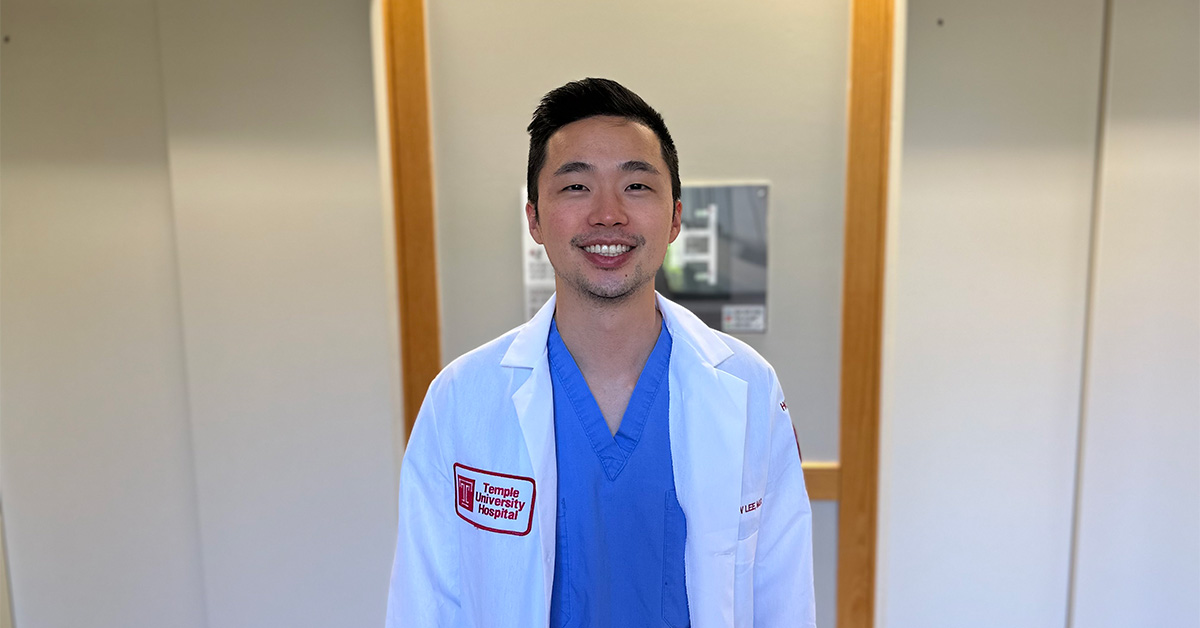
PHILADELPHIA (April 28, 2023)—Matthew Lee, MD, MBA, a resident in the Department of Urology at the Lewis Katz School of Medicine at Temple University, will discuss his use of a new robotic laparoscopic procedure to treat a complication caused by cancer radiation therapy at this year’s American Urological Association (AUA) 2023 Annual Meeting.
“We successfully performed this novel technique on a patient with a long-segment radiation-induced ureter stricture,” said Lee. The condition is due to scarring that narrows the ureter, the tube that carries urine out of the body. Blocked urine flow can cause a variety of urinary tract issues, including inflammation or infection.
“Ureteral strictures that develop after prior pelvic radiation therapy are difficult to surgically manage due to increased fibrosis and risk of further damage to the fragile blood supply of the affected ureter. In our study, we demonstrated a new technique for managing this condition,” Lee said.
The technique, robotic-assisted laparoscopic transureteropyelostomy, involves excising the strictured portion of the affected ureter and swinging the healthy remaining ureter and attaching it to the renal pelvis on the opposite side.
The case that Lee discussed involved a 62-year-old female with a history of pan-ureteral stricture on her left side following treatment with radiation therapy for cervical cancer. The patient was previously managed with ureteral stents. Preoperative renal scans showed a split function of 60% and 40% in the right and left kidney, respectively, with a mildly delayed nephrogram on the left side. The patient elected to undergo a robotic transureteropyelostomy.
There were no complications during the operation and the patient was discharged the day after surgery. The patient’s ureteral stent was removed six weeks postoperatively, and she did not experience any postoperative complications.
“The patient had improvement of her renal function and had resolution of her obstruction on her 12-week postoperative renal scan. Her flank pain had completely resolved,” Lee said. He added that use of the technique could help patients avoid the morbidity associated with ileal ureter reconstruction and can serve as an alternative approach for these patients.
Lee said he was grateful for the opportunity to present his experience because it allowed him to share a technique performed by Daniel D. Eun, MD, Chief of Robotic Surgery and Director of the Minimally Invasive Robotic Urologic Oncology and Reconstructive Surgery Program at Temple University Hospital.
Eun, who is widely considered to be a pioneer in robotic urologic and reconstructive surgery, said Lee presented the technique as an invited “Rising Star” trainee. “Given that Temple is one of only a few worldwide centers of excellence in robotic urinary tract reconstructive surgery, I was asked to pick one of my trainees who I thought had promising talent to be a future leader to present something cutting edge,” Eun said.
“At Temple, we try to push the needle and find innovative methods to treat difficult pathologies,” said Lee. “I am excited at the opportunity to share new, reproducible surgical techniques for various clinical pathologies at the AUA meeting.”